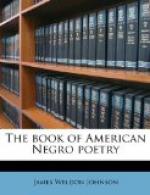Joseph S. Cotter, Jr.
A Prayer
And What Shall You Say
Is It Because I Am Black?
The Band of Gideon
Rain Music
Supplication
Roscoe C. Jamison
The Negro Soldiers
Jessie Fauset
La Vie C’est la Vie
Christmas Eve in France
Dead Fires
Oriflamme
Oblivion
Anne Spencer
Before the Feast of Shushan
At the Carnival
The Wife-Woman
Translation
Dunbar
Alex Rogers
Why Adam Sinned
The Rain Song
Waverley Turner Carmichael
Keep Me, Jesus, Keep Me
Winter Is Coming
Alice Dunbar-Nelson
Sonnet
Charles Bertram Johnson
A Little Cabin
Negro Poets
Otto Leyland Bohanan
The Dawn’s Awake!
The Washer-Woman
Theodore Henry Shackleford
The Big Bell in Zion
Lucian B. Watkins
Star of Ethiopia
Two Points of View
To Our Friends
Benjamin Brawley
My Hero
Chaucer
Joshua Henry Jones, Jr.
To a Skull
PREFACE
There is, perhaps, a better excuse for giving an Anthology of American Negro Poetry to the public than can be offered for many of the anthologies that have recently been issued. The public, generally speaking, does not know that there are American Negro poets—to supply this lack of information is, alone, a work worthy of somebody’s effort.
Moreover, the matter of Negro poets and the production of literature by the colored people in this country involves more than supplying information that is lacking. It is a matter which has a direct bearing on the most vital of American problems.
A people may become great through many means, but there is only one measure by which its greatness is recognized and acknowledged. The final measure of the greatness of all peoples is the amount and standard of the literature and art they have produced. The world does not know that a people is great until that people produces great literature and art. No people that has produced great literature and art has ever been looked upon by the world as distinctly inferior.
The status of the Negro in the United States’ is more a question of national mental attitude toward the race than of actual conditions. And nothing will do more to change that mental attitude and raise his status than a demonstration of intellectual parity by the Negro through the production of literature and art.
Is there likelihood that the American Negro will be able to do this? There is, for the good reason that he possesses the innate powers. He has the emotional endowment, the originality and artistic conception, and, what is more important, the power of creating that which has universal appeal and influence.




